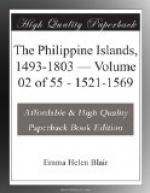Pero Bernaldez.)
(This copy was compared before me, Baltesar de Freitas, notary of the fleet, in the said day, month, and year, aforesaid.
Baltesar de Freitas.)
(On the said day, month, and year, above-mentioned, I was present at the correction of this copy.
Fernando Riquel.)
Second Summons: Replying to this reply to my first summons, made by the very illustrious Miguel Lopez de Leguazpi, general of the camp and of the people of Nova Spanha, I declare that the essence, subject, and right of all this matter is not contained in words, but in deeds; and that his grace has up to the present time acted in a way very displeasing to God, to his majesty and to the king our sovereign, as I shall set forth in detail. As regards his grace’s coming by authority of his royal majesty, the king Don Felipe, in order to discover lands, the islands of the West lying within his demarcation, and to propagate Christianity therein, as should be the principal purpose of so Christian a prince; and bearing withal instructions not to enter into aught, or in any way infringe the treaty and agreement made between the emperor Don Carlos and the king our sovereign Don Joan the Third (both of whom I pray God may have in glory): this does not absolve, but rather condemns him, inasmuch as he has acted in a manner so contrary to his instructions, neither making discoveries, nor founding any Christian communities, nor limiting himself to his own demarcation, but hastening with great speed to penetrate so many leagues through our demarcation—contrary to the faith, oath, agreement, and instructions of his true king and lord. He would indeed be able to say that he was ignorant of the bound and limit of these two demarcations, if Father Urbaneta had not told and requested him to settle such of the Ladrones Islands as, on his way around them, he might discover; if his majesty had not charged him not to enter, under any consideration, into the territory belonging to the king our sovereign; and if he had not been told and informed by the ships which were in this vicinity that the islands belonged to us, all which will appear, in proper time, in documents sworn before a notary. His grace’s saying, in his letter written to me at Maluco, that he entered into this our conquest in consequence of stormy weather surprised me not a little, for the Portuguese in their voyages from Portugal to India (although even more exposed to inclement weather, to more violent winds, and to rough and heavy seas), never encountered a tempest of such violence as to endure for more than twenty-four hours, or in which, however far one of our ships might run, (with sails either furled or spread forth to the wind) they ever passed over an extent of more than fifty or sixty leagues—although, it is true, I have heard it said that one of our ships once ran a distance of eighty leagues; but his grace’s having entered three hundred leagues into these waters




